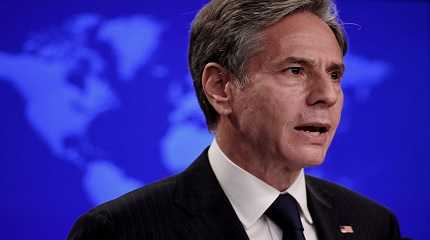
WASHINGTON, March 21 (Reuters) - The United States formally determined that Myanmar's army committed genocide and crimes against humanity in its violence against the Rohingya minority, U.S. Secretary of State Antony Blinken said on Monday, warning that as long as a military junta was in power nobody in the country would be safe.
Announcing the decision, which was first reported by Reuters on Sunday, Blinken said the attacks against Rohingya were "widespread and systematic" and that evidence pointed to a clear intent to destroy the mainly Muslim minority.
The determination could bolster efforts to hold the Myanmar generals accountable and help prevent further atrocities, U.S. officials believe. Activists welcomed the move, but called for concrete actions like tougher sanctions on the junta.
In his speech at the U.S. Holocaust Memorial Museum in Washington, the top American diplomat read out tragic and chilling accounts of victims, who had been shot in the head, raped and tortured.
Myanmar's armed forces launched a military operation in 2017 that forced at least 730,000 Rohingya from their homes and into neighboring Bangladesh. In 2021, Myanmar's military seized power in a coup.
"Since the coup, we have seen the Burmese military use many of the same tactics. Only now the military is targeting anyone in Burma it sees as opposing or undermining its repressive rule," Blinken said.
"For those who did not realize it before the coup, the brutal violence unleashed by the military since February 2021 has made clear that no one in Burma will be safe from atrocities so long as it is in power," he added.
Days after U.S. President Joe Biden took office, Myanmar generals led by Commander in Chief Min Aung Hlaing seized power on Feb. 1, 2021, after complaining of fraud in a November 2020 general election won by democracy champion Aung San Suu Kyi's party. Election monitoring groups found no evidence of mass fraud.
The armed forces crushed an uprising against their coup, killing more than 1,600 people and detaining nearly 10,000, including civilian leaders such as Suu Kyi, according to the Assistance Association for Political Prisoners, an advocacy group, and setting off an insurgency.
Blinken's recognition comes after two earlier State Department examinations failed to produce a determination on the atrocities, which U.S. officials had only referred to as "ethnic cleansing" until now.
"There is no doubt that being allowed to get away with genocide of the Rohingya encouraged the military to think it could get away with holding a coup as well," said Tun Khin, a Rohingya activist who heads the Burmese Rohingya Organisation UK and attended Blinken's address.
"Accountability for Rohingya genocide will not just help protect the Rohingya, it will help protect all the people of Burma.”
FEW REAL CONSEQUENCES
In response to the coup, the United States and Western allies sanctioned the junta and its business interests, but have been unable to persuade the generals to restore civilian rule after they received military and diplomatic support from Russia and China.
Advocates say Monday's declaration, which does not automatically unleash any punitive measures but carries political weight, could help judicial efforts worldwide to hold the junta accountable, but say more action needs to follow.
Washington should work through U.N. bodies to push for accountability while also extending sanctions to target the foreign currency reserves Myanmar's junta gathers from oil and gas revenues, said John Sifton, Asia advocacy director at Human Rights Watch.
“The Myanmar military will continue to commit atrocities so long as other governments fail to impose measures to hold them accountable,” Sifton said.
Blinken on Monday announced $1 million in new funding for a U.N. investigation on Myanmar and said the United States has shared information with Gambia connected to its case at the International Court of Justice, where it has accused Myanmar of genocide.
Monday's announcement comes after more than four years of examinations by the State Department, including a 2018 report prepared with outside lawyers that surveyed more than 1,000 Rohingya refugees living in Bangladesh.
Three-quarters of those surveyed had witnessed the military kill someone and more than half witnessed acts of sexual violence, Blinken said, adding the findings "demonstrate that these abuses were not isolated cases."
Blinken also recalled the experience of his stepfather, Samuel Pisar, who was sent to the Nazis' first concentration camp at Dachau a dozen years after it was built - an example of how the groundwork for genocide is laid over years or even decades.
An exhibit at the museum showed how Rohingya had their rights and citizenship "methodically stripped away" over many years, Blinken said.




